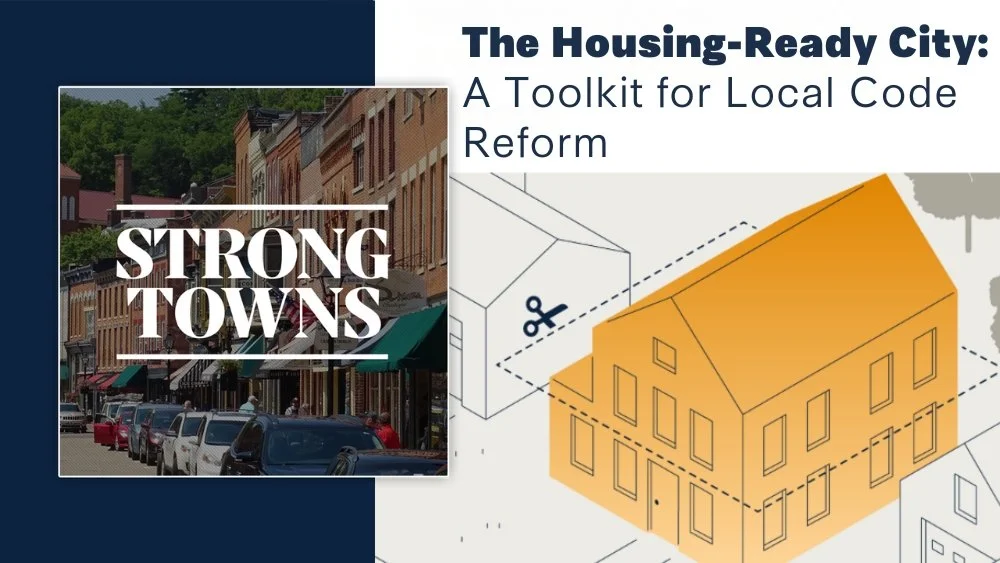When cities attempt to prescribe the exact way a building must be used, they risk regulating away the very life of a place.
Read MoreA South Dakota agriculture company is being charged $50,000 for its road use. Abby and Edward discuss the balancing act of infrastructure costs and municipal budgets, especially in rural areas. (Transcript included.)
Read MoreSunbelt cities have long prided themselves on having affordable and abundant housing. However, they’re now seeing housing construction stagnate and rapidly rising costs. Abby is joined by trained architect and video creator Rachel Leonardo to discuss whether these cities can course correct.
Read MoreBrandi Thompson is the co-founder and leader of Strong Towns ABQ, a Local Conversation in New Mexico. She discusses the strategies that have helped her group successfully advocate for zoning reform and against highway expansions.
Read MoreToday, Chuck is joined by Jeff Speck, a city planner, author, and principal of an urban design and consultancy firm. They discuss the ideas shared in Chuck’s book “Escaping the Housing Trap” and how those concepts play out in the real world, including examples from Jeff’s own work. (Transcript included.)
Read MoreA new push for parking reform in Connecticut reveals just how much public space and revenue towns are losing to outdated requirements—and what policymakers can do to fix it.
Read MoreNorth Carolina lawmakers have joined forces across party lines to make housing easier to build—here’s what they’re proposing.
Read MoreSoaring home prices and tight housing supply are pushing local leaders to find creative solutions. Seattle’s embrace of backyard cottages has quietly delivered thousands of new homes right where they’re needed most.
Read MoreHow do you provide the housing your community so desperately needs if you’re not wealthy enough to attract developers? If you’re Greenfield, Massachusetts, you start getting creative.
Read MoreZoning codes across the country attempt to define what a "family" is, often in ways that are not only outdated but also legally tenuous at best. Instead of pretending we can enforce arbitrary definitions of family, let’s focus on what actually impacts people's lives.
Read MoreWith office vacancies and housing needs at record highs, converting one into the other seems like an obvious fix. However, office conversions are very difficult and expensive. Cities would get better results by enabling incremental development.
Read MoreChuck is joined by Seth Zeren, a neighborhood real estate developer, to discuss the six code reforms recommended in “The Housing-Ready City: A Toolkit for Local Code Reform.” (Transcript included.)
Read MoreReducing minimum lot sizes can unlock the potential for smaller, more affordable homes while meeting the needs of the community. Here’s how one developer got community support and multiplied housing availability.
Read MoreSmall, adaptable homes create opportunities for individuals and families to build stable, connected lives. Here’s how this style of development is creating housing opportunities in Florida.
Read MoreLegalizing backyard cottages can improve residents' quality of life and help families stay connected, all while increasing housing supply and affordability without large-scale disruption to the community.
Read MoreTo understand how one city leader can spearhead the housing reforms your city needs, look no further than Rebekah Kik, the deputy city manager for Kalamazoo, Michigan.
Read MoreHere’s how Portland, Oregon, is getting more housing built that blends into existing neighborhoods and earns the approval of nearby residents, all while increasing affordability and supporting the local community.
Read MoreIn this episode, Abby is joined by Chicago aldermen Matt Martin and Andre Vasquez to discusses the Western Avenue corridor study, one of the most ambitious planning efforts Chicago has seen in decades. (Transcript included.)
Read MoreParking regulations impose unnecessary restrictions on adding new housing. Many cities recognize this problem but struggle with how to address it effectively. Dubuque, Iowa, offers a real-world example of both the problems and an effective response.
Read MoreOn a recent Upzoned episode, I joined Abby Newsham to discuss Massachusetts’ effort to sue a city over exclusionary zoning near transit stations. After it aired, we received some thoughtful critiques from listeners who felt the conversation missed key historical and legal context. I’d like to address those critiques today.
Read More



















